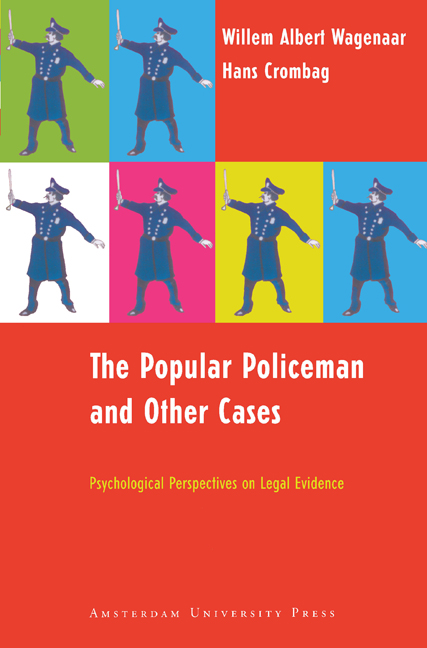Book contents
- Frontmatter
- Contents
- Foreword
- 1 Illegal Gambling or the Victory Travel Club
- 2 On Causal Reasoning or Death in the Warmoesstraat
- 3 Consumer Confusion or Potato Chips and Olive Oil
- 4 Fiction and Reality of ‘the Average Individual’ or the Case of Old Mr. Lane
- 5 Case Histories and Scientific Proof or the Case of JR
- 6 Not a Good Story or the Disappearance of Maddy and Vicky
- 7 Conflicting Scenarios or the Case of the Man who Needed a Companion
- 8 Two Processes Obstructing the Accuracy of Long-Term Memory or the Case of the Stolen Mercedes
- 9 Confessions after Repeated Interrogation or the Putten Murder Case
- 10 Collaborative Storytelling or the Artist’s Models and an Angry Neighbourhood
- 11 Allegation of Sexual Child Abuse in a Case of Disputed Visitation or Cindy's Story
- 12 Psychogenic Amnesia or the Case of the Amnesic Strangler
- 13 Obeying Reflexes or Death on the Climbing Wall
- 14 Visual Acuity or Shooting Mimi the Cat
- 15 Sexual Semiotics or the Case of the Popular Policeman
- Postscript: Psychological Expertise and the Law
- Bibliography
- Name Index
- Subject Index
3 - Consumer Confusion or Potato Chips and Olive Oil
Published online by Cambridge University Press: 16 February 2021
- Frontmatter
- Contents
- Foreword
- 1 Illegal Gambling or the Victory Travel Club
- 2 On Causal Reasoning or Death in the Warmoesstraat
- 3 Consumer Confusion or Potato Chips and Olive Oil
- 4 Fiction and Reality of ‘the Average Individual’ or the Case of Old Mr. Lane
- 5 Case Histories and Scientific Proof or the Case of JR
- 6 Not a Good Story or the Disappearance of Maddy and Vicky
- 7 Conflicting Scenarios or the Case of the Man who Needed a Companion
- 8 Two Processes Obstructing the Accuracy of Long-Term Memory or the Case of the Stolen Mercedes
- 9 Confessions after Repeated Interrogation or the Putten Murder Case
- 10 Collaborative Storytelling or the Artist’s Models and an Angry Neighbourhood
- 11 Allegation of Sexual Child Abuse in a Case of Disputed Visitation or Cindy's Story
- 12 Psychogenic Amnesia or the Case of the Amnesic Strangler
- 13 Obeying Reflexes or Death on the Climbing Wall
- 14 Visual Acuity or Shooting Mimi the Cat
- 15 Sexual Semiotics or the Case of the Popular Policeman
- Postscript: Psychological Expertise and the Law
- Bibliography
- Name Index
- Subject Index
Summary
Manufacturers of consumer goods have a legal obligation to inform the consumer accurately about the nature and the origin of their products. Company B should not create the suggestion that its products are manufactured by Company A, and should also not suggest that its products have certain properties which, in fact, they do not. Litigation about such issues is of considerable importance to almost every large national and multinational industry. Many have a specialised legal department involved in watching and, if necessary, prosecuting competitors who allegedly invade their rights.
The basic issue in the thousands of lawsuits every year is the allegation that consumers are confused by the suggestive or blatantly untrue statements by competitors. Such confusion may lead consumers either to buy products manufactured by company B believing that they are produced by A or to buy products in the false belief that they have certain properties.
The legal issue is how a court or jury can decide that the average consumer of a certain product will in fact be confused. The simplest way for judges and juries to decide such matters is to consider whether they themselves would be confused. If so, they may reason that others will be equally confused and decide accordingly. In many cases the litigating parties do not dare to rely on the uncertain outcome of such subjective judgements in multi-million cases. Instead, they offer the results of empirical investigations based on samples from the consumer population, demonstrating that these sample consumers actually were, or were not, confused. Often the marketing researchers who conduct these studies are asked to testify in court, while others are asked to comment on these studies as counter-experts. One of us has served as an expert witness in a considerable number of such cases (see: Verkade & Wagenaar, 2002).Monahan & Walker in their ‘cases and materials’ book provide a brief overview of such cases litigated in the United States of America (Monahan & Walker, 2002).Apart from the predominantly legal literature, there is almost nothing published about the European situation, which is shaped mainly by the decisions of the Court of the European Union in Luxemburg, and for the Netherlands by those of the Benelux Court for Trademarks.
- Type
- Chapter
- Information
- The Popular Policeman and Other CasesPsychological Perspectives on Legal Evidence, pp. 43 - 56Publisher: Amsterdam University PressPrint publication year: 2012



